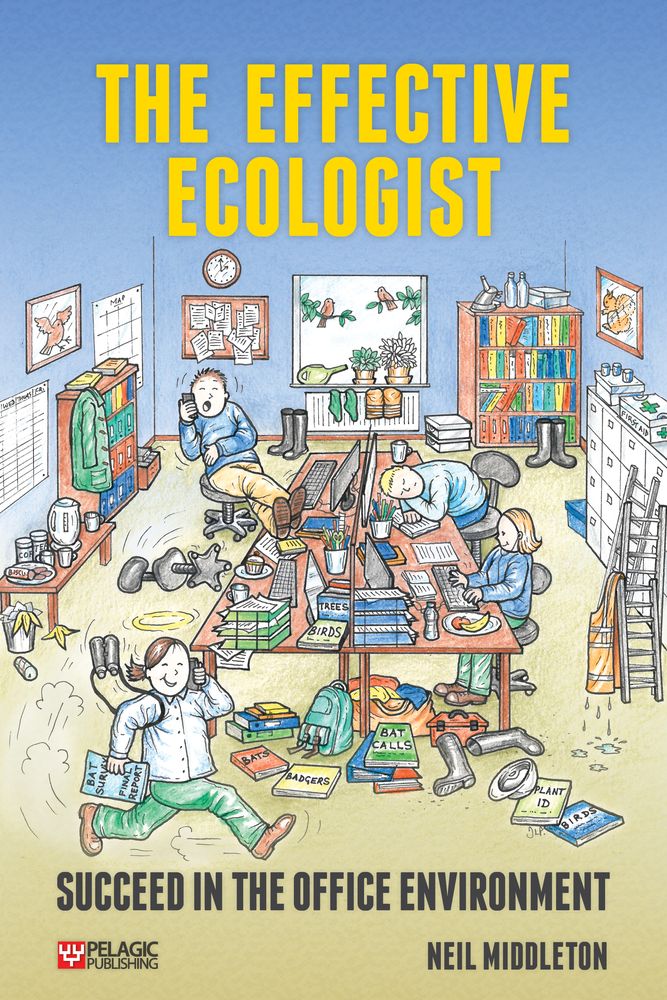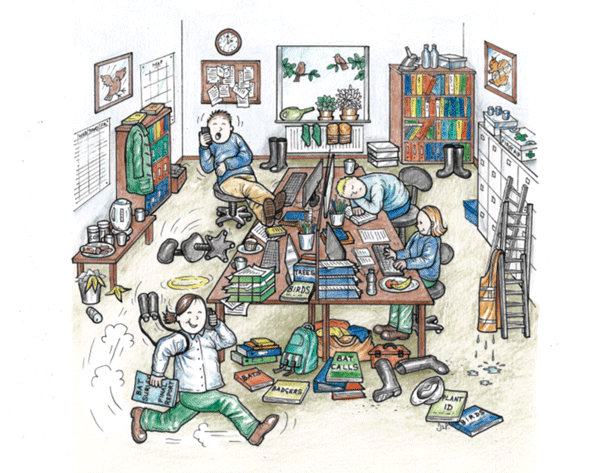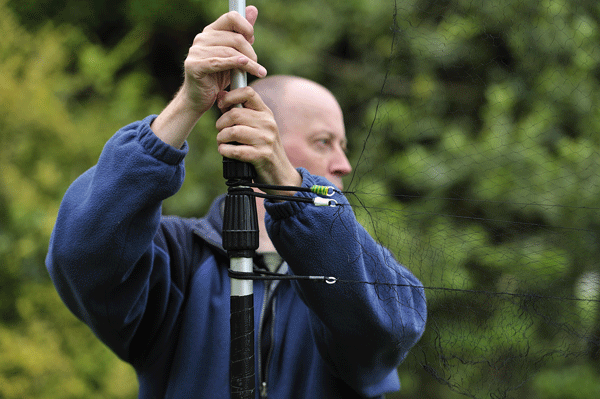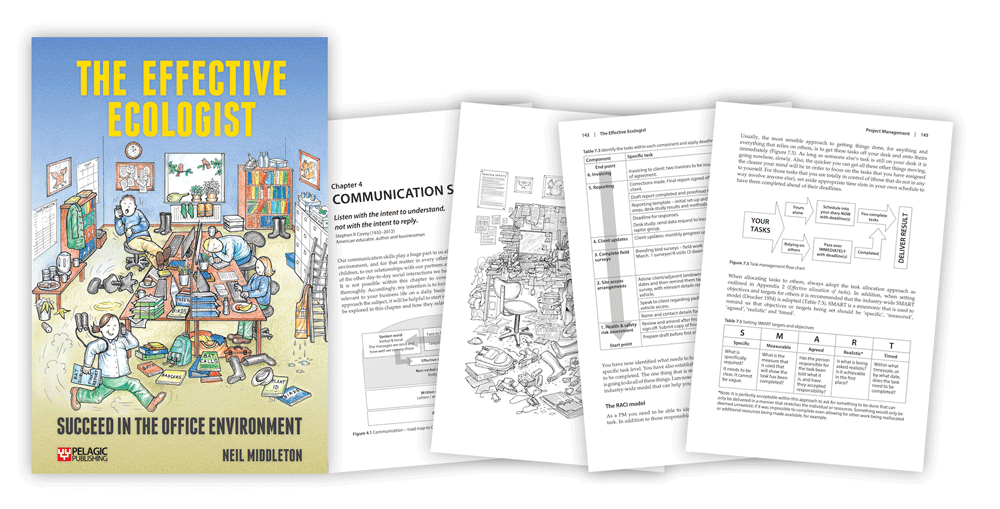 Neil Middleton is an entrepreneurial ecologist who is the managing director of consultancy Echoes Ecology Ltd, and Time For Bespoke Solutions Ltd, a company that provides management consultancy and people development solutions.
Neil Middleton is an entrepreneurial ecologist who is the managing director of consultancy Echoes Ecology Ltd, and Time For Bespoke Solutions Ltd, a company that provides management consultancy and people development solutions.
Many will recognise Neil as co-author of Social Calls of the Bats of Britain and Ireland, however it is his passion for workplace training and development that is the driving force behind his latest book, The Effective Ecologist: Succeed in the Office Environment.
What inspired you to write this book?
The number of times I see people who have paid lots of money and spent a huge amount of their time being educated and trained to work within our sector, only to find that so many of the things that differentiate the mediocre from the brilliant just haven’t been covered. I spend a lot of my time being asked by people for advice and guidance, and felt that no one else had attempted to tackle the subject matter from the perspective of an ecologist. I found this quite irritating and eventually decided that if no-one else was going to try and help, then I would.

Office success… isn’t it all a good work ethic and common sense?
In part, most definitely – I would not deny that. But if it is as simple as that why do so many people struggle to deliver a number of the ‘non-ecological’ aspects of their work to the highest level. And what is a good work ethic and common sense? Has anyone ever described that to you in the role you are in? Do you know, specifically, the things you should be focusing on and the pitfalls you should be avoiding. Do you know how to manage your time better, be more professional, be better organised? Who in your working environment is assisting you in a structured way with these things? Other types of business within the service sector (which is where ecological consultancy sits) spend huge amounts of time and resources training their people on some of the material I am writing about here. For some reason this isn’t that evident within ecology. As I say in the book – sitting in today’s ecological consultancies we have ecologists who are managing people, dealing with customers, project planning, marketing products, producing financial reports… They are expected to perform all of these responsibilities, and many more, to a high level, as well as the ecological aspects of their role. How many of them have been given training or proper guidance about how to perform these non-ecology aspects of their role to a high level?
Would you mind telling us about your worst office etiquette blunder?!

It makes me shudder thinking about the number of blunders I have made over my working life, and still do. I will keep it ecological.
I once got into a lift with a bloke who used to be my YOC leader about thirty years earlier (for those youngsters out there, the YOC used to be the junior branch of the RSPB). It just so happened that many years later, coincidentally, we were both working for the same insurance company. He didn’t normally work from our office. I saw him in the distance and quickened my step in order to catch up with him, so that we could share the lift. I said good afternoon, asked him how he was and then proceeded to tell him all about this excellent spot I had found for watching raptors (he was a member of his local raptor group after all). Anyway, it turns out he was in the building to meet with our regional manager (Tracey), who, as it happens, was also my boss’s boss. So being helpful I took him to Tracey’s room, continuing to tell him about some of my latest bird sightings.
They met, and Tracey welcomed him by saying, “Brilliant to meet you again John.” The guy I had been talking to – or at least I had thought I had been talking to – wasn’t called John! Yes I had just met some random stranger (considerably more senior to myself in the business) in the lift and had swamped him with ornithological anecdotes. The bloke didn’t know me at all, but remained polite throughout, and thought he had just met some nutter in the lift. I doubt that he would have ever been able to tell a Kestrel from a Griffon Vulture, let alone a Sparrowhawk from a Goshawk. And after Tracey had finished her meeting? Yes I was called in to explain myself, as John had obviously told her all about it. Before long everyone on the floor had heard about what had happened.
Sounds painful! In your experience, what are the three most common office faux pas people might make?
In no particular order, and in haste, these are today’s examples. Ask me tomorrow and I would come up with a different list, I am sure.
- Failure to communicate effectively. For example, not saying the right thing to the right person at the right time. Almost everything that goes wrong in a work setting (or for that matter personal settings) boils down to poor communication or no communication.
- Doing the wrong things in the wrong order when under pressure. Time is evaporating and you are wasting the remaining time doing stuff that isn’t going to get you to where you need to be.
- Not preparing enough. To fail to prepare, is very much to prepare to fail. Too often people aren’t very good at playing ‘consequences.’ They don’t think what is going to happen next, and then after that, and so on. This means that a few steps down the line when something unexpected happens they are caught off guard. If only they had thought it through and prepared properly to begin with, that unexpected situation should’ve been precisely one of the scenarios they should’ve accounted for days, or even weeks, earlier.
Say I’m an ecology graduate passionate about reversing habitat loss and saving endangered species. How does this book help animals?
If you want to be successful working with a subject you are passionate about, and do this to a high level, and therefore in your example, help animals as much as you can, then this book talks about the skills that, quite possibly, will make you considerably more effective, more professional, a better communicator, more organised, a better team player, and much more. Ask yourself – are you happy at being merely OK at what you do, or do you want to make the best use of your time in order to have the greatest positive impact upon the things you are passionate about? So I would challenge you to keep buying all the books about the animals you are so passionate about, and yes you will undoubtedly learn more about the technical aspects of your role, but this book (at less than twenty quid and a handful of hours) will open the door to many of the tools you can use to turn that knowledge and passion into the actionable events that will make the difference. I am afraid to say that passion and knowledge alone are rarely enough.
If I may I would also like to say that the material in the book is not just for new entrants into the role. There is so much in here that is equally applicable to more experienced ecologists, managers and those in a training role within our sector. There is already an excellent book about How to Become and Ecological Consultant (Searle, S. M., 2011). This new book is the next step in the process and could easily have been called ‘How to succeed now you have a job, and in doing so perform at the highest level.’
How would you describe the unique challenges facing graduating ecologists in 2016, and in what ways do you think today’s graduates differ from those of ten or fifteen years ago?
The one thing that has been evident throughout the last decade is that, in the main, people qualifying from colleges or universities just aren’t work ready to enter many ecological consultancies. It is the ever present scenario, ‘You can’t get a job without experience. But how do I get the experience without a job?’ Many of the people we see coming into our own business for interviews have been told very little, if anything, about the consultancy sector, and even less about the business skills they will need in order to give themselves any chance of success. I find this quite frustrating as ecological consultancy work is probably one of the more realistic career options that people going through an appropriate university degree can hope to pursue.
Also, for someone to spend all of that time and expense gaining a qualification that so often tells them so little about the natural world in their own country is disappointing. We see many people that may know quite a bit about overseas mammals or habitat for example, but would struggle to identify a water vole! There are exceptions to this, but based on the CVs we have passing regularly through our inboxes, they are very much exceptions.
As managing director of two companies, as well as a bestselling author, time management must be a well worn tool in your kit bag. What’s your top time management tip?

Everything in this world is affordable or available at some level apart from time itself. It doesn’t matter how rich you are, how many people you have in your team, whether or not you are the best at what you do. Once a moment has passed you can never get it back, you can never go back to yesterday and undo the thing that prevents you doing what you should be achieving today.
My top tip – treat time as the most precious commodity you have available to yourself, organise it well, be protective over it and use it well. Make sure you spend your time doing things that make a difference – if there is no benefit to spending time on something then stop doing it. No benefit, no point. One of the ways I focus on this is, when I go to bed each night I list in my head what I will achieve tomorrow – and nine times out of ten I do it. Sometimes it’s painful, sometimes other things get in the way (often in fact) – but I don’t go to bed the following night regretting how I have spent my time today, and I don’t make excuses. We all are equally rich with the time we have immediately in front of us. The choice is, how do you choose to use it to best effect?
And what three daily habits would you encourage any office worker to take up starting tomorrow?
- Look at what you have on in your diary for tomorrow and next week, today – and not tomorrow morning. If you don’t have a diary, then get one, use it, and keep it with you at all times. Don’t have separate diaries for personal and business. You can only be in one place at any one time. People keeping two diaries tend to be unable to commit to things because their other diary is at home, or at some point make errors that needn’t have been made. I have a whole section about this in the book and I don’t sit on the fence about it.
- Every phone call you have with a colleague, a customer or a supplier – immediately follow it up with an email. Get into this habit and you will protect yourself and the business from someone saying in the future that they didn’t agree to that, or they hadn’t understood what you meant at the time etc. You will never know which one of these every day conversations will come back to bite you, but beyond doubt one or two of them will. When that happens you will regret not doing that email. You know you are right, but you can’t prove it, and now others are doubting you. Don’t regret it, it’s a controllable – do the email.
- Be on time, every time – without fail. People that keep time well tend to be organised, professional and of course in the right place at the right time. Too often first impressions and daily tasks are tarnished or ineffectively handled because someone is late. It’s not professional and it certainly is disrespectful to others.
If there is one thing you wish you had known at the beginning of your career, what would it have been?
How important all of these business-related skills are to giving yourself a chance of being better at what you do. In my own world at that time I thought it was just down to being technically good enough, and gaining experience. It isn’t. Being technically brilliant doesn’t make you the best person at the job – being effective does. This is what the book is about. I am trying to enable others to realise, earlier on, many of the things that no-one told me about at the beginning.
There is a big marketing dilemma with this book. Firstly, those people who already know some of this stuff will buy it and probably learn some new stuff to add to their tool box. Then, those who are struggling might think it’s worth a shot – can’t do me any harm. But many more will feel that they don’t need it. They are getting on just fine as they are, and they don’t know what they don’t know. These are the ones that may benefit the most, irrespective of what stage in their career they are at. If you are one of these people, and you are the only one in your team that reads the book – then immediately you have an edge. Conversely if everyone in your team has read it and you haven’t – well… To summarise, I wish I had read this book 35 years ago.
What would be one of the most challenging training situations you encounter on a regular basis?
Referring to my office blunder answer – it’s now time to fess up! I am good at remembering names, and pretty good at remembering faces, but an Achilles heel is most definitely putting the two things together at the right time. This is an area that I find myself constantly having to focus time and effort on. Put an audience in front of me and I have various tricks I adopt to help reduce the chances of me getting someone’s name wrong. Occasionally though, regretfully, I make a mistake and have to apologise.
How has self-development been important to you in your life?
If you stop developing you stop improving, you stop getting better and you stop learning. After that… then is there really much point in doing what you are doing? You may as well say to yourself – ‘well this is as good as I will ever be and I am going to stop trying to be better.’ I am sure that there are lots of happy people out there who from a professional perspective are able to be like that. I find that approach odd and uncomfortable, and as such I just want to keep learning how to avoid making mistakes, or when that fails, learning what I could do next time that would result in a better outcome.
Who or what has had the most impact on your success?
Who? – So many people, ranging from people I currently work with, all the way back to when I was in the insurance sector and before that in the leisure and catering sector. I am where I am now (we all are!) because of who we have listened to and looked up to in the past.
What? – Not being afraid to push myself in a professional setting. If something seems beyond me or too difficult or almost impossible I would rather try and fail (failure gives you the ammunition to do it better next time!) than wonder, what if? It is quite daunting doing something like writing a book. I suspect many people don’t do things because they think they can’t, or they don’t want to risk making a fool of themselves, or are overly concerned what others might think. My advice would be, whatever you set your sights on – go for it. The worst that will happen is that you will learn a lot about yourself. The best that could happen should be self-evident. The one certainty is that if you don’t try it you will achieve nothing, learn nothing and always wonder ‘what if?’
What are you looking forward to in 2016?
At the moment improving my running technique, lots of bat work and my holiday in the south of France in August (I will have my diary with me though!), when I can do some batting and birding for pleasure, and spend good times with my partner, Aileen, who inspires me to be the best version of myself that I can be. But don’t tell her about the batting and birding bit – she thinks it’s a holiday; not a self-development opportunity.
The Effective Ecologist: Succeed in the Office Environment is available to order from NHBS







